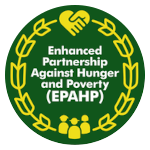The Enhanced Partnership Against Hunger and Poverty (EPAHP) was formed after the success of the Partnership Against Hunger and Poverty (PAHP) program of the Department of Agriculture (DA), Department of Agrarian Reform (DAR), and Department of Social Welfare Development (DSWD) and was implemented through the signing of Memorandum of Understanding on December 9, 2019.
The EPAHP is one of the banner programs of the Inter-Agency Task Force Zero Hunger. It aims to reduce hunger and poverty in the country by means of collaborative efforts of the partner agencies which would create greater synergy in engaging the poor, the community-based organizations (CBOs), to improve their capacity while addressing hunger and poverty. This shall be achieved by capacitating the CBOs and linking them to the institutional feeding programs of the government.
In accordance with the above-mentioned MOU, “xxx… the DSWD shall serve as the lead agency in the EPAHP implementation.” Furthermore, Article 1 Section 3 (b) of the same MOU states that one of the EPAHP program’s components is the capacity building and productivity improvements for the CBOs.
Our CBOs are created so that they may be sustained and inherited by future generations. However, despite the number of programs implemented, still and all, they need capacity-building interventions which would greatly contribute sustainability of our CBOs. These CBOs are our entrepreneurs who are confronted with the current situation of market competition. Giant businessmen are most likely dominating the market and these CBOs are left on the other side of the corner. Moreover, our CBOs lack the “technical know-how” on how to effectively manage the organization and lack the necessary skills for the financial management and recording of their day-to-day business transactions. With the new EPAHP program, it is mandated that these CBOs are offered assistance for capacity building and productivity to further improve, preserve, and empower them to participate as suppliers to the institutional markets, such as but not limited to feeding programs of the government. This initiative of the government under the Zero Hunger Program shall increase their income and financial capacity and encourage CBOs to produce more agricultural products, and help the government ensure food and nutrition security.
